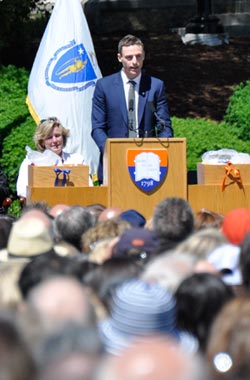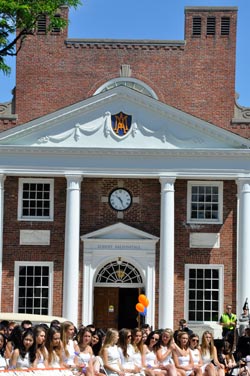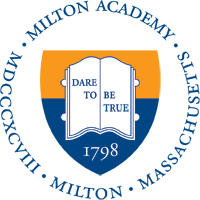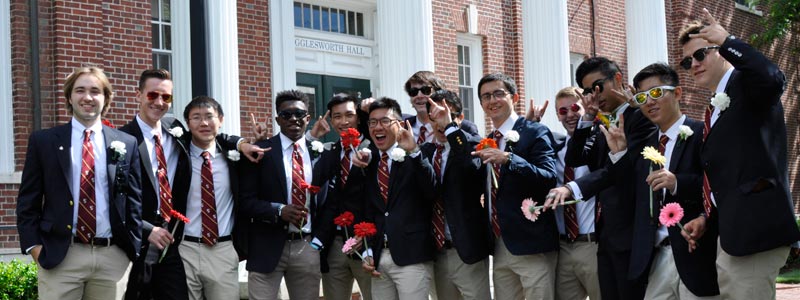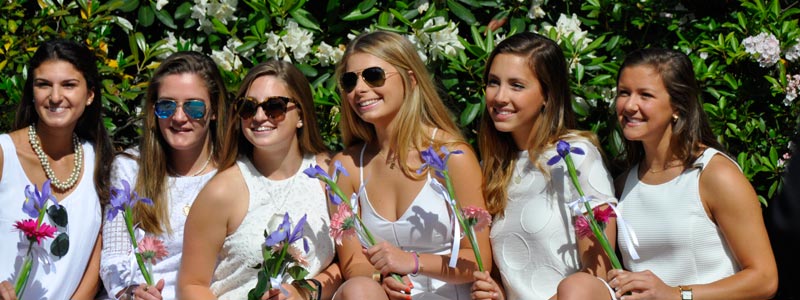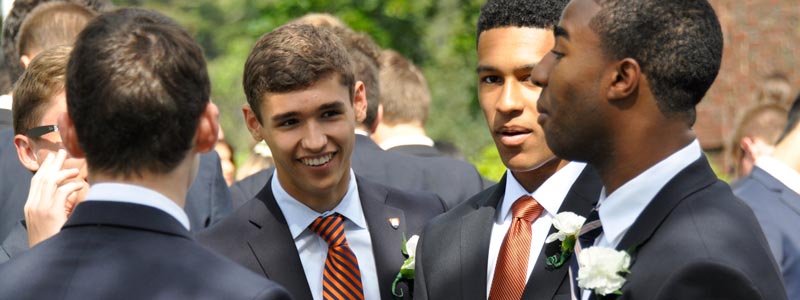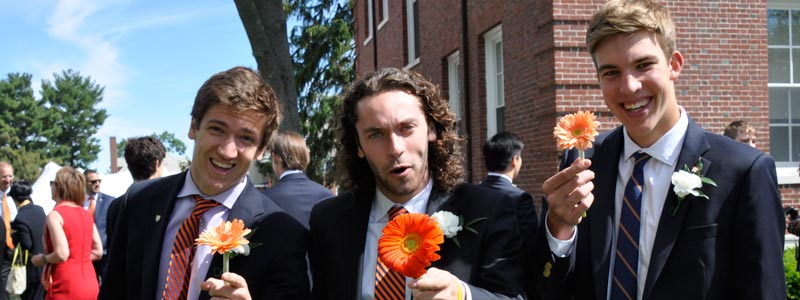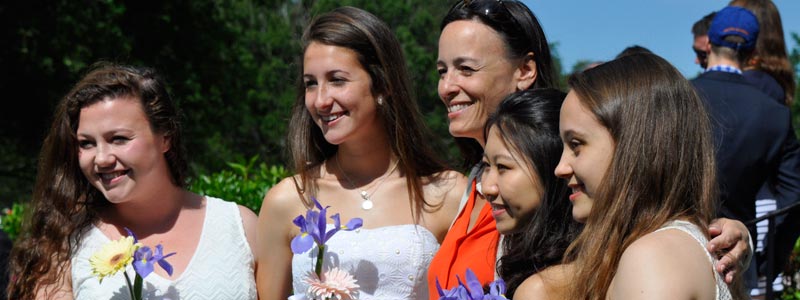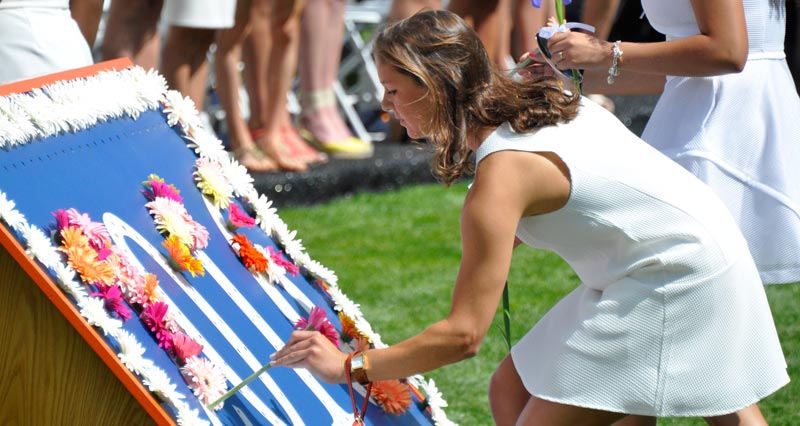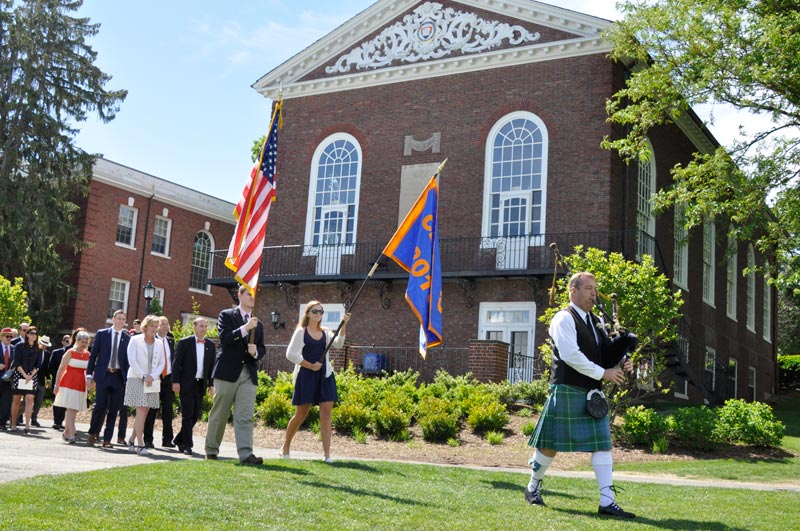Graduation 2016

Milton awarded diplomas to 189 seniors during the School’s commencement exercises on June 10, 2016. One longstanding tradition of the ceremony is students electing their student speakers, which assures seniors that they will, at their last Milton gathering, hear from classmates they have chosen. This year, students selected Juan Diego Jaramillo and Melody Tan. Delivering the commencement address was alumnus Conor French, Milton Academy Class of 1999. A corporate attorney turned social entrepreneur, Conor French ’99 is the CEO of Indego Africa—a nonprofit enterprise that partners with cooperatives of nearly 500 female artisans in Rwanda and Ghana. Indego Africa tries to break cycles of poverty by providing women with the tools and support to flourish as independent businesswomen and drive development in their communities.
Speech by Melody Tan '16
Some time in the next two hours, all of us intelligent, talented, charismatic, beautiful, awesome seniors sitting up here will emerge from our cocoons and fly away as alumni. Today will be our first day of life beyond Milton, and that’s beyond terrifying. Milton has taught me a lot over my three years here: self-expression, public speaking, civil discourse, other kinds of discourse. One of the most important skills I developed was independence, though it wasn’t what I was expecting. I was already pretty self-reliant before Milton. I could pour myself cereal, go to school, come back, and do homework all without being told. But when I got to Milton, I was faced with a different kind of independence, the gargantuan task of wrangling that beast: unstructured time. Suddenly I had this new block of free time, Monday through Friday, between 3:30 and 5:30 with all these options at my fingertips: sports, arts, clubs, tech, whatever I wanted! I was free! I felt the same unfettered joy when I went on senior project this spring. No one could tell me what to do! I was all grown up! Except independence is…hard.
I’m sure most of you sitting up here today remember senior skip day. I’m sure most of you would rather forget it. And I’m sure most of you would rather I didn’t mention it in front of your parents. But one day, around two months ago, a vast majority of the senior class rose up in protest against an administration-sanctioned senior skip day. We didn’t need an artificial day off handed just to us! No! We were masters of our destinies, and we would skip a day of classes on our own terms! That day (sorry, Mom, sorry, Dad) I joined some of my classmates and cut my first two classes, earning myself my first and last hour of detention ever. I guess I’m a delinquent now. Take me away, officer. So what did I do with my time off? I slept in. Until 8:30. I had some cereal. I checked my social media apps. I rearranged my furniture. This is what real life is, huh? A void with no direction or purpose? After an hour and a half of no classes, I didn’t know what to do with myself anymore. There was nothing left for me to do. So, bored out of my mind, I went back to class. After finally putting on my “big girl shoes” and taking my first experimental step as an independent “adult,” I was already backpedaling into childhood. Ha! And I thought I was ready to take on the “real world.” For so much of my childhood, I was the “mature” one. I considered myself “wise beyond my years.” I could pour my own cereal. But throughout my Milton experience, I realized that I was nowhere near ready.
I guess chaos—or rather, those times when no one is telling me what to do—never really appealed to me. At the beginning of my senior English Non-Fictions class, my teacher told us that she would not be giving us traditional letter grades on our essays, and I think I went into cardiac arrest. No grades? No numbers? No rubric? Nothing to tell me exactly what to do to maximize my academic performance? What? What do you mean, “that’s what real life is”?
I used to think of adulthood as a time when I would be free to do whatever I wanted, to choose my own path. But then I took a Behavioral Economics class, in which we discussed the multitude of logical fallacies that plague our every choice, and now I realize that every decision I make is wrong. There was no way I would survive without people telling me what to do. And that suspicion was confirmed by the three days I spent visiting college this spring. I had all these events I could go to, but no one to tell me if I was doing it right or wrong. I could go out without telling anyone, but no one was making sure I got back. I’m pretty sure I ate only one vegetable that entire weekend (if you count pizza as a vegetable). I had to actually think about how much it costs to eat! I was practically kissing the quad when I stepped back onto Milton’s campus. Those three nights were a peek into Pandora’s box—the chaos of the adult world—and I wanted nothing to do with it.
Technically I’m not an adult. I’m only 17. But the closer I get to my birthday (July 4th for anyone who wants to get me anything), the less I look forward to being one. Adulthood comes with responsibilities and hard truths. Warning: This part of the speech contains some adult language—401K, credit score, job interview, membership at a wholesale club, pouring myself extra-fibery cereal. You mean that in addition to structuring my own time—the burden of being “self-motivating”—I have all these other things to worry about like taxes and frequently eating alone? I’m scared, okay? I admit it. I like my zone of comfort where I know people care about me. I like my assignments with clear grading guidelines on a ten-point rubric. And I fear the unstoppable avalanche of responsibility without guidance that’s going to hit me…basically, tomorrow. I dread the day when I have no clear guidance to help me succeed, to tell me what to do to succeed, to tell me I am succeeding! Do you mean, as an adult, I have to tell myself what to do? I’ve got to find my own definition of success?
But Milton, truly the gift that keeps on giving, has continued teaching me lessons even when I’m no longer in class. For the past month, many of us seniors have dropped our classes to go on senior projects. And despite all the stress I went through during the project proposal process in February, despite my track record of always going to class, I consider my senior project a success. Given the chance to forgo grades, numbers, and rubrics, to forge my own path, to face the chaos of the real world, I was actually able to give myself assignments. And now they were ones that I wanted to do, ones I was passionate about. What I’ve realized after the project process, and an entire month of no classes, is that I no longer need school to give me order and purpose in this chaotic life. Though I am scared, I can structure my own time. I can make my own dreams and pursue them. I can, in fact, dare to be true.
Obligatory school motto aside, I guess after years of worrying about my inability to properly adult, my last days at Milton have helped me understand that I can cross those bridges when I come to them, and that I will have what it takes to cross those bridges. Every adult on this quad has done it. Life beyond Milton will not be a burning hellscape. Besides, the added responsibility and freedom are only part of what is to come. And the rest, as I see it, is more of everything I like about life now: Opportunities to grow and learn. The company of my family. Shenanigans with good friends. Pouring myself the cereal I want to eat, when I want to eat it! Who knows? Maybe someday I’ll even find myself able to handle some unstructured time.
Thank you.
Speech by Juan Diego Jaramillo '16
New England’s deciduous forest and a miraculously comfortable Greyhound bus cradle two of my dorm mates as one sleeps on the other’s shoulder, and the other finds a spot on the first one’s head. The image made me do a double take, not because it is a rare sight, but because, soon enough, it will be. Class of 2016, welcome to our last day—the last day we’ll all be together in the same capacity. Like, ever.
Endings and goodbyes can be somber, but today is also a day for celebration, and I don’t mean that in a “Woo! We’re never gonna see each other ever again!” kind of way. Milton has had an incredibly memorable group in the Class of 2016. We’re fabulously accomplished and talented, but too often we allow negativity to cloud the way we talk about ourselves.
Our class may not be the first class one thinks of upon hearing the word “togetherness.” Sure, we’ve had our differences, but that should not be lamented as a sign of a weak class. Whether we’re talking about sports, academics, politics, race, or whatever else people find passion in, the Class of 2016 always demonstrates conviction in our words. When objectively looking at our skills and accomplishments, the entire idea of “togetherness” seems overrated.
Mr. Hales, of the math department, talks about Milton being a mountain range. Hold your hand up with your fingers splayed apart. This hand, like a mountain range, represents part of the class in front of you. Any class, like a range, has a handful of peaks and valleys with some standout characters and personalities. Now hold up your right hand in the same manner and touch the tips of your thumbs together. This is the Class of 2016. Where our class differs from any other is in just how many summits we have. I’m not saying this in a romantic, “everyone-is-special” kind of way; for better or worse, we are a class of monolithic temperaments and opinions. Really a more accurate representation would be if we connected this entire first row of peaks and valleys. Now, imagine your arms as tectonic plates and slide your hands one over the other, watching the natural conflicts that come about when such powerful forces collide. The Class of 2016 has so many crests casting so many shadows and sliding along so many different tectonic plates that every once in awhile something has to give, and a little earthquake or volcanic eruption happens. Ok, a couple of times it was a magnitude 9, Krakatoa-style situation.
But, you know what? Without tectonic cataclysm we wouldn’t have the Himalayas, or the Hawaiian Islands, or even that rock in the middle of the freshman boys’ soccer field. Heck, the continents would still be Pangaea! (You know, the supercontinent that existed during the late Paleozoic and early Mesozoic eras.) And you know what Pangaea didn’t have? Diversity. There was no need for wacky animals like kangaroos or koalas to exist in such a uniform world. The world is only so beautifully diverse because of the continental drift separating us. Milton is a lot like that. We are a class of rare breeds primed to thrive in novel environments. A certain breed of “togetherness,” like that of Pangaea, leads to a uniform culture with no regard for unpopular opinions, dissenting viewpoints, or novel insight. A certain breed of “togetherness” favors a single voice, rejecting multiculturalism and standing athwart the Milton mission.
Embracing diversity is written into Milton’s mission statement, and judging from the rest of the mission, the Class of 2016 represents a peak year for Milton Academy. The mission asserts that Milton “create[s] a community in which individuals develop competence, confidence and character.” My classmates and I are reasonably competent, maybe a bit too confident, and character—yeah, we have some of that. The mission also tells us that we are “unafraid to express our ideas,” and that cultivated within us is “a passion for learning and a respect for others.” Even within the cursory small talk we share in the Student Center or in Forbes, I feel the intense mental ravenousness of our class. If there’s some random, very specific thing you’d like to learn a ton more about, you’ll probably find someone with an unreasonable deluge of knowledge about that thing. One time a very good friend suddenly started to recite the entire script of Pirates of the Caribbean, not one, but II: Dead Man’s Chest. She had this down to the most minute sound motifs and the most inconsequential cinematography. It was crazy, but really one of the crazier parts of this story is that there was another one of my friends right there checking her. He also had extensive knowledge of this apparently generation-defining film, and was able to back up what she was saying. Though I was pretty disturbed by all of this, the joy that flooded their faces as they reminisced about this seemingly inconsequential, shared experience was contagious, and I actually started wishing I had seen this cinematic landmark.
Though extremely rattling at the time, these classmates give me an important lesson about looking back: There’s nothing wrong with rosy-eyed, slightly obsessive nostalgia. I’ve been nostalgic about this place for what feels like forever, and I hope everyone here, especially the Class of 2016, can find a way to look back on their time at Milton with a deep appreciation.
Let’s go back to the image of my dorm mates sleeping on one another. As the bus headed toward Boston, the handful of us coming back from the Cape were all able to step outside the Milton bubble and take a good look at our last two weeks as seniors, as high schoolers, and as Miltonians. I, in turn, also looked back at the previous four years of my life. Looking at my two cuddling friends filled me with a deep affection; I could remember my first time meeting them. We had nothing in common, so we thought we had nothing to talk about. But we eventually understood the beauty that comes with not having anything in common, and with this beauty we were able to grow as friends and as peaks in the Milton community. As the stylishly-gelled hair of one splayed onto the gap-mouthed face of the other, I thought about how proud I was of both of them for becoming indispensable not only as friends to me, but also as artists, athletes, scholars, and leaders. As one mumbled to himself and the other clamped his teeth tightly, I hoped that they would have a fantastic time at prom next week, and that they would finally unleash the dances we’d mastered in the dorm onto the rest of the School. As one’s collared shirt grew wrinkled and the other’s gray sweater remained stained, I imagined a life without the luxury of seeing them every day.
So now, looking out at all your beautiful faces, I urge you all to take the time to be appreciative of what surrounds you. In moments of noteworthy jubilation, take a quiet moment to soak in all you can, so that in moments of somberness you may reflect positively upon your histories. Flanked on both sides by the Class of 2016, I am afraid that I am too late in urging everyone to take time to be appreciative, so I offer an alternate piece of advice: be nostalgic. Obsess over the moments that you want to obsess over, replay them in your head whenever you need, and always be sure to take away the positives from every experience.
I can’t help but feel my own combination of both jubilation and somberness in this very moment, so I’d like to end with a sonnet. If there’s anything I’ve learned from English class here, it’s that there’s nothing like a good sonnet for the melancholy scholar.
Do not lament our disparate selves on this
a day for exaltation. Celebrate
the student body and the summer’s bliss.
Class IV, you show great promise, cooperate and
Remember our strengths, but not the rest.
Class III, you will be fine I guess somehow.
Class II, how long it’s been since you were pests.
I am in earnest, here and now, please bow
to everything, for blades, green under feet,
are sacred. Books are better read, and love
your teachers. Time flies fast but you, replete
With duties, chores, and homework must have fun.
Class I, I love you all and now we’re done.
Speech by Conor French, Class of 1999
Thank you Lisa for the kind introduction.
Let me start by being among the first to officially welcome you into the extraordinary fellowship of Milton Academy alumni. It is a deep and massively impressive roster. It includes Nobel laureates, groundbreaking artists, captains of industry, changemakers and policymakers, and, now, as of today, all of you. Congratulations! You rock.
This is a once-in-a-lifetime experience for you graduates and for your families. I’m humbled and honored by your willingness to share it with me. I suspect my presence on stage with you today owes in part to fortuity: my unconventional career arc coinciding with a rise in interest in social entrepreneurship and innovation. But I’ll take it. Over the course of my life, I’ve learned slowly but surely to accept and trust recognition – even when, as I confessed to Todd some months ago, the prospect of joining you today sent tidal waves of Impostor Syndrome surging through me.
* * *
So, on a seminal day like today, where can we begin? Let’s ground ourselves in a common starting place. Dare to be true. Everyone here is eminently familiar with Milton Academy’s motto. After being on this campus for a few years, you probably have a pretty good idea of what those words mean to you in the context of your Milton life.
But, with a vast, incalculable post-prep school future spread out before each of you, what we’ll try to tackle here today is what “Dare to Be True” can mean to you tomorrow…on your first full day post-Milton. What I’ll offer you is the notion of daring to be true as an elegant composition of four interconnected virtues: (1) caring is cool, (2) relentlessly challenge the status quo, (3) stand bold, and (4) hard times require furious dancing. For simplicity sake, from here on out, we’ll call each a Daring Virtue.
PRELUDE
Before I jump in, I’m going to ask you to keep two simple things in mind. The first is that there is nothing I’ve done that you can’t do too.
I am not a genius. I know this because, as a senior here, I was outshined in a Calculus class by an eighth grader who was an actual genius—a designation which when readily bestowed on someone other than you really only reinforces that you’re not one. I got DC-ed…conduct prejudicial to the Academy…what else…and, technically, Deans Committee-ed too…if we’re counting. I’ve made a near-catastrophic number of mega blunders—in English workshop and in life.
Without sounding weirdly competitive, I’m probably more like you than almost any graduation speaker who has preceded me. I’m neither a former President…except, I suppose, of Common Ground and ISS, to the extent one or both of those venerable affinity groups still exist…nor a former governor. While I’m pictured on the walls of Forbes House, I’ve never adorned the glossy pages of Forbes magazine. I’m not a prize-winning author or a celebrated thespian and I’m certainly not romantically linked to Captain America—although like any loving husband, I do wonder from time to time if my wife is a superhero.
I work hard, do my best to live earnestly and intentionally, and wrestle daily with anxieties that I’ve consolidated into a single worthy antagonist affectionately called The Fear. You’ll have to trust me, but we’re far more alike than we are different. All of us.
* * *
The second thing I’ll ask you to keep in mind is this: you belong and, 17 years ago, so did I.
It is nearly impossible to capture the unsettling blend of unbound and yet unmoored leaving behind Milton Academy must feel for each of you. Coming from New Bedford, Massachusetts, I struggled to adjust to life at Milton. I remember feeling on graduation day like, just as I’d finally figured out what I needed to do to succeed here, I was suddenly being cast out…consigned to tumble toward an unknowable future without all of the familiar guardrails and guideposts I’d internalized from my Milton experience.
Graduating is undoubtedly an individual experience for each of you, but each of you should feel unwavering certainty that you belong. You’ve earned your diploma and earned your place among the spectacular constellation of Milton graduates, past and present.
Caring is cool
With those two things in mind, let’s start with Daring Virtue number one: caring is cool. I realize that there are probably a million hipper or more eloquent ways to say this. Rather than fretting too much over that, however, I’ll summon one of Milton’s favorite pedagogies, “show; don’t tell,” to help illustrate what I mean.
In 2010, I left my law firm after four years to help artisan women in Rwanda lift themselves out of poverty. At Indego Africa, our market access programs helped these women earn income to meet their families’ basic needs. At the same time, our business and management training provided them opportunities to acquire the necessary skills to run their own profitable businesses over the long-term.
If forging pathways for African women toward financial independence sounds like a far cry from corporate law, that’s probably because it is. But I eventually swapped lawyering for women’s empowerment because I cared, and still care, so deeply about creating economic opportunities for people around the globe. Moved by that caring…and perhaps by the values of a mother who was a feminist long before feminism got cool…feminism is, by the way, very cool…I dug in enough to understand that empowering women worldwide is the right thing to do, it is effective, it is the smart thing to do, and because it keeps us safe.
Many of you may’ve read Half the Sky, where the authors proclaimed gender inequity as the slavery of our time. The prevalence of gender-based discrimination means we all share a clear moral imperative to put a stop to it. It is the right thing to do. Women’s empowerment is also effective because of the multiplier effect. Studies show that women and girls re-invest over 90% of their income into their families and their communities. It’s the smart thing to do because if you look at the future demographics of our global workforce and consumer landscape, empowering women is critical to a sustainable future economy. Finally, it keeps us safe because building capacity among women and providing them access to functional economies has been shown to significantly reduce security threats such as terrorism. It is a cost-effective way to keep ourselves and our nation safe.
For me, committing to caring about making a difference in the lives of female entrepreneurs fundamentally changed me. Incidentally, it also exposed me to a universe of other remarkable people who cared. And perhaps unsurprisingly there, even in a nation as small and tucked far away as Rwanda, other esteemed Milton alumni showed up chief among them. There was Emma Clippenger, Class of 2004. She cared so deeply about combating global food insecurity by growing and eating healthy food that she founded Gardens for Health immediately after college. There was Dai Ellis, Class of 1993. He cared so much about education that his diversion from his HIV/AIDS prevention public health day job was to found Kepler (formerly, Orphans of Rwanda) to provide university scholarships to vulnerable youth.
Both those organizations are still thriving today. In fact, our three organizations have worked together. It should make every Mustang heart beat with pride to know the impact footprint that our alumni fellowship has had in a country whose tragic past was largely obscured here by coverage of the OJ Simpson trial.
You can, and should, care about many different things—people, places, subjects, personal goals, career objectives. The list goes on. The important thing is that, when you find those things that you care deeply about, you roll up your sleeves or get nerdy or do whatever you need to do to make caring about them a priority in your life.
RELENTLESSLY CHALLENGE the status quo
That brings us to our second Daring Virtue, relentlessly challenge the status quo.
Milton has taught each of you how to think. You’ve learned from some of the most masterful teachers who’ve ever taken up the craft. Mr. Hilgendorf inspired me to riff on the historical legacies of John Coltrane and Malcolm X. The recently-retired Ms. Steimle patiently coaxed my writing from scattered insights toward persuasive exposition. The late Mr. Hughes nurtured and enriched what would become a formative obsession with literature. For you boarders—Forbes for life!—you’ve even lived with some of them. I don’t know that I ever found instructors as dedicated, creative, and dynamic as our faculty here.
By virtue of your Milton education, and your willingness to care, you will have not only 20/20 vision when it comes to seeing problems around you, but also the tools and perspective to solve them. This does not mean you alone need to carry the weight of the world on your shoulders; nobody can, or should, bear that burden. It just means that you’ll live your life uncommonly well-positioned to join, or even lead, those “small group[s] of thoughtful, committed citizens” that, according to anthropologist Margaret Mead, are the only thing that has ever truly changed the world.
What attracted me to Funding Circle, where we’re reimaging how we finance small businesses, was the disconnect between small business’ relative importance to our economy and their poor access to the resources they need to grow and expand. At Funding Circle, our borrowers are Main Street small businesses. These small businesses employ roughly half of our American workforce. They have accounted for two-thirds of net new jobs over the past two decades. And they serve as critical onramps for their owners to broader prosperity, which in turn helps address income inequality.
Yet, for many of these 28 million American small businesses, the status quo of traditional financing options isn’t working. I won’t digress too far into the details, but 20- to 30-year structural factors have engendered a small business credit gap and the 2008 financial crisis and its aftermath have only widened it. We, at Funding Circle, understand that American entrepreneurs need access to credit to create jobs and unleash economic growth for the next generation. So, we set out to leverage technology, advanced analytics, and a lower cost structure to radically transform the way our financial system matches investor capital to small business borrower demand.
It’s also worthwhile to consider that entrepreneurship, social or otherwise, is only one way to challenge the status quo. Many of you may devote much of your professional lives to working for larger, established institutions. There can be immense power and reward to following that path. But even those institutions desperately need intrapreneurs, people within who “think outside the box” or take risks in an effort to solve problems.
I’ll share a brief example of intrapreneurship and how you can activate yourself as an agent of change from within. In my current field, small business credit, as with many underserved or underbanked markets, borrowers are often targeted by predatory lending practices. Rather than turning a blind eye to the financial exploitation of the people we aim to serve, I coauthored a Small Business Borrowers’ Bill of Rights. This Borrowers’ Bill of Rights called upon every small business lender to adopt clear baseline industry standards for transparency, fairness, and inclusion. For instance, frustrated that no federal law and fewer than a dozen state laws prohibited credit discrimination on the basis of gender identity or sexual orientation, we challenged not only our company but our entire industry to ensure that LGBT small business owners enjoyed the non-discrimination protections that they rightfully deserve.
Given the recent passing of Muhammad Ali, I’ll leave the call to action for this Daring Virtue to the Greatest of All Time. He once cautioned, “impossible is just a word thrown around by small men who find it easier to live in the world they’ve been given than to explore the power they have to change it.”
STAND BOLD
Moving on to Daring Virtue number three, I want to delve a little bit into what it means to stand bold.
Bear with me for a moment while I share a bit about my former business partner, Emelienne Nyiramana. Emelienne was in secondary school when the 1994 genocide erupted. Separated from her family, Emelienne endured the next two months alone, eluding génocidaires in fields, jungles, and homes. The youngest of seven siblings, including three brothers and three sisters, she emerged from hiding to discover that each of her brothers, her father, and two of her sisters’ husbands had been killed.
Undaunted, Emelienne bravely rose from these circumstances to complete her education, have a family, and found a cooperative of seamstresses called Cocoki. She didn’t stop there. She took her Indego Africa business training so seriously she eventually applied, and earned acceptance, to Goldman Sachs’ 10,000 Women program. She somehow willed herself from abject poverty and loss to become a highly-skilled artisan, a business woman, and a family breadwinner, not to mention a committed parent, a respected community member, and a leader. Cocoki has now produced textiles for some of our most iconic fashion brands…Anthropologie, J.Crew, and Nicole Miller to name a few.
I once asked Emelienne how she’d overcome so many seemingly insurmountable obstacles in her life. She smiled shyly and proclaimed: “Conor, you have to stand bold.”
I sat where each of you are sitting 17 years ago. In those 17 years, I’ve made tons of decisions—some wise, some less so. But what I can assure you is this: no one decision will define you, but every decision provides an opportunity to change you. Standing bold is not just about finding your inner strength in life’s defining moments; it is about having courage in everything you do.
A few years ago, I was honored to be named among the most influential young foreign policy professionals; after my initial shock at the recognition itself came the even greater surprise at the category: they had labeled me as a “risk-taker.” I had always equated risk-taking to some sort of deliberate imprudence or penchant for unnecessary peril, like driving without a seatbelt or free-climbing some remote rock formation. It never occurred to me the true importance of taking the healthy, everyday risk of being courageously ourselves.
Sometimes courage may drive us toward self-discovery. Sometimes it might challenge us to supplant our hurt or anger with empathy or compassion. Sometimes it spurs us to love another, a spouse, a child, a friend, as much or more than we love ourselves. And sometimes courage requires us to face down injustice, even where its very existence may benefit or insulate us.
HARD TIMES REQUIRE FURIOUS DANCING
And so that leaves us with our final Daring Virtue: hard times require furious dancing.
At times life can feel impossibly difficult and riddled with setbacks. You may’ve experienced this already, but you can do everything right and still find yourself frustrated or feeling lost or in despair. Unfortunately, everybody faces adversity of some kind, but what many people don’t fully appreciate is our ability to adapt to change and to overcome. On this, I feel I’m uniquely qualified to speak. Not necessarily due to particular hardships I’ve faced, though there have been plenty, but because I’ve seen firsthand the indomitable spirits of the women with whom I worked in Rwanda. Their examples reaffirmed for me time and again that “tough times don’t last, but tough people do.”
Early on at Indego Africa, I received an email from our in-country staff that recounted a storytelling session at a newly-formed partner cooperative, Abasangiye. It referred to an unnamed woman who, in the face of her neighbors’ death threats during the genocide, had tried to commit suicide by throwing herself into a latrine. She survived the fall and instead lived down there for five days while people urinated and defecated on her.
When several years later, Joselyne Nibagwire, a charismatic cooperative leader whom we’d selected for an artisan trip to the U.S., sat down with us to pen her biography, it seemed utterly impossible that that same woman was her…the same woman who would charm and disarm her way through Amex, Google, and the U.S. Department of State…the same woman who’d shrug and calmly tell a room full of fashion buyers that “if [she] didn’t die in the genocide, [she] realized maybe there was a reason for that, and maybe [she] needed to move forward with [her] life”…and then would implore the buyers to go back to discussing the products she’d carefully laid out for their inspection.
I share Jocelyn’s story by no means to belittle our collective struggles, but so that we as a community never forget the immeasurable depth and power of human resilience. No one is immune from life disruptions, so the best we can do is to never, ever underestimate the vitality of our own human spirit. The best we can do is to embrace those things that anchor us and lean on them to constantly remind ourselves that, whatever comes our way, we always have the strength to bounce back.
For my wife, it is her faith. For my father who has coped his entire life with depression, it is painstaking self-awareness…and building stone walls (don’t ask, I don’t know either). For the poet Alice Walker, from whom I borrowed the phrase that encapsulates this Daring Virtue, it evidently is dancing…furious dancing. For me, it is shared laughter with family and friends and fellowship with people like Emelienne and Jocelyn, who never stopped believing in themselves and that what they did mattered—not just to them, but to all of us.
Someone once told me that it isn’t a matter of if we’ll fall, it’s a matter of when and how often. What matters then is that we accept that we will fall and learn to fall gracefully so that we don’t let the fear of falling deter us.
CONCLUSION
Your four-plus years on this campus, with this peerless faculty and this gifted and diverse senior class, represented a journey of personal empowerment.
That empowerment, when unleashed, has the power to impact millions. As importantly, that empowerment has the power to forever impact you—who you are and how you engage the world around you. About 30 minutes from central Kigali, Rwanda, sits the airy main office of Gardens for Health, which I mentioned was founded by a Milton alum. In that office, moated by meticulously arranged rows of kale plants and banana trees, scrawled on the central roofbeam is a phrase: “We are who we’ve been waiting for.”
Where today concludes one journey of empowerment, let tomorrow mark the audacious beginnings of another. Congratulations, Class of 2016! And never stop daring to be true!
Class of 2016 Graduates
Ryan Whitacre Allen, Brentwood, NH
Jacob Eli Aronoff, Newton, MA
Annabell Opare Asare, Taunton, MA
Trevor Wells Atkeson, Larkspur, CA
Elise Bozkurt Atkinson, Cambridge, MA
Gavin Emory Baker-Greene, Milton, MA
Madeline Sears Barnes, Dover, MA
Charlotte Rose Bern, Hingham, MA
Alexander James Bernard, Duxbury, MA
Graham Spencer Blackburn, Cohasset, MA
Jonathan Matthew Blaize, Milton, MA
Lyla Claire Bonaccorso-Nulisch, Gloucester, MA
Ethan Elijah Borsook, Concord, MA
William Addison Bowden, Wellesley, MA
Elizabeth Ann Bower, Chestnut Hill, MA
Gabrielle Loren Bower, Canton, MA
Jason Gregory Bowman, Milton, MA
Kolbi Alana Bradley, Washington, DC
Adam Jonathan Bramson, Dover, MA
Samuel Clayton Brigham, Waban, MA
Christopher Michael Bucci, Newton, MA
Andrew Ilhoon Byun, Boston, MA
James Doulos Cadigan, Milton, MA
Lydia Grace Capicotto, Webster, NY
Julia Marie Carabatsos, North Easton, MA
Jonathan Kai Shun Chan, Hong Kong
Aeshna Monica Chandra, Sharon, MA
Sophie Noelle Charles, Milton, MA
Aimee Nicole Chea, Nassau, Bahamas
Belle Chen, Beijing, China
Janice Chen, Quincy, MA
Yik Huen Christie Cheong, Hong Kong
Max Tribley Chiaramonte, Paget, Bermuda
Min-Shik Chung, Busan, Korea
Sophia Katherine Cloherty, Wellesley, MA
Finley Thomas Cobb, West Burke, VT
Bridgett Anna Condon, Scituate, MA
Caroline Victoria Conway, Weston, MA
Mary Constance Corcoran, Milton, MA
Rachel Alexis Corcoran, Milton, MA
Jeremy Charles Cowham, Quincy, MA
Domenic Malik Cozier, Milford, MA
Maya Inez Davis, Dedham, MA
Nathaniel Allen Deacon, Warren, RI
Madeline Elizabeth Dewire, Hingham, MA
Cameron Christopher DiGiovanni, Milton, MA
Anna Marie DiGravio, Milton, MA
Sterling Belden Hazard Dintersmith, Jamestown, RI
Madina Diop, Brooklyn, NY
Mitchel John Donovan, Cumberland, ME
Chelsea Erin Dougherty, Smithtown, NY
Andrew Mark Dumaresque, Nova Scotia, Canada
Madeleine Rose Dupre, Wellesley, MA
Isabel Barton Emerson, Belmont, MA
Molly Kim Emmons, Dedham, MA
Xavier Lee Etheridge, Roxbury, MA
Gabriella Nwogo Ziporah Etoniru, Bridgewater, MA
James Joseph Fadule, Wellesley, MA
Alexander Thomas Falcone, Canton, MA
Morton Lazell Fearey III, Duxbury, MA
Deanna Ferrante, Carver, MA
William Robert Fitzpatrick, Marblehead, MA
Sarah Casey Ford, Cohasset, MA
Edward Spencer Fox, Ontario, Canada
Alexander Christian Frongillo, Milton, MA
Isabelle Greenwood Gilman, Dedham, MA
Alexander Fallon Gistis, Milton, MA
Carolyn Ann Giuggio, Cohasset, MA
Max Edmund Glattstein, Duxbury, MA
Emily Frances Grace, Duxbury, MA
Liam Max Shulman Grantham, Los Angeles, CA
Marcus Elijah Green, Brooklyn, NY
Jeremy Andrew Gross, Needham, MA
Marcus Guenther, Miami, FL
Charlie Rose Whitmore Guscott, Milton, MA
Corey Andrew Hales, Milton, MA
Yudaam Han, Alberta, Canada
Mary Swift Handy, East Greenwich, RI
Elizabeth Keating Hemp, Jamestown, RI
Samuel Levi Hitt, Milton, MA
Sydney Katherine Hoffman, Marblehead, MA
Arthur Rush Hogan IV, Duxbury, MA
Nicholas Hogan, Westwood, MA
Katherine Porter Frey Holmes, Wellesley, MA
Trevor Scott Hopkins, Wellesley, MA
Paul James Housey Jr., Raleigh, NC
Simone Aureon Hunter-Hobson, Middletown, NY
Rika Ichinose, Brookline, MA
Juan Diego Jaramillo, Revere, MA
Jadeite Awilda Javier, New York City, NY
Jiyoung Jeong, Newton, MA
Aaron Kenneth Johnson, Milton, MA
David Kenneth Jones, Brookline, MA
Krist Joti, Tirana, Albania
Tarin Karimbux, West Roxbury, MA
Jeong Woo Kim, Seoul, South Korea
Madeleine Bess Landau, Natick, MA
James Hutchinson LaRochelle, Milton, MA
Vivian Jones Lee, Boston, MA
Andrew Grant Leffler, Scarsdale, NY
John Luca Levee, Kingston, Jamaica
Tianyu Lin, Wenzhou, China
Andrew Christopher Lu, Brookline, MA
Benjamin Takeichi Makishima, Milton, MA
Anne Elizabeth Malloy, Canton, MA
Peter Hayden Mansfield, Stockbridge, MA
Isabel Thorpe Manuel, Beverly, MA
Mark Joseph Massa, Needham, MA
Caroline Day McCammond, Dover, MA
Cale Michael McCormick, Mercer Island, WA
Quintin John McDermott, Franklin, MA
Nicholas Pennoyer Mehlman, Farmington, CT
Isabella Alana Miller, Milton, MA
Andrea Joy Minicus, Hingham, MA
Mohamad Mirzan, Kuala Lumpur, Malaysia
Israel Garrett Moorer, Minneapolis, MN
Michael David Morin, Raynham, MA
Jacob William Munroe, Los Altos, CA
Jared Gorfinkle Murphy, Milton, MA
Madeline Martignetti Murphy, Hingham, MA
Elizabeth Jane Muse, Milton, MA
Ryan Enrique Navas, Fort Lee, NJ
Hannah Diane Nigro, North Easton, MA
Michael Nicholas Njauw, Hong Kong
Hadley Pratt Noble, Falmouth, ME
Cameron Thomas O’Connell, Hingham, MA
Daniel Joseph O’Connor Jr., Duxbury, MA
Cole Mairtin O’Flaherty, Milton, MA
Michaela Kristen Olson, Milton, MA
Jerry Adroit Ozor, Accra, Ghana
Sophie Stuart Kopanon Palmer, Rockport, MA
Avery Anna Park, Walpole, MA
Natalie Michal Perlov, Westwood, MA
Juliet Fannie Gershon Pesner, Chestnut Hill, MA
Izaac Adam Polukoff, Park City, Utah
Zoe Beatrice Pottow, Greenwich, CT
William Peter Nathaniel Powers, Orleans, MA
Katherine Frances Pratty, Manhattan Beach, CA
Emil Qiu, Manchester Center, VT
Kellie Christina Quinn, Marshfield, MA
Shay Christopher Quintin, North Attleboro, MA
Ravi Rahman, Needham, MA
Rajiv Ram, Newton Highlands, MA
Brett Joseph Reilly, Marshfield, MA
Jordan Alexander Park Remar, Hollis, NH
Kevin Hua Ren, Shanghai, China
Ian Jae Hwan Rhee, Canton, MA
Ellora Nimbkar Rich, Hanover, MA
Samuel Ross Rochelle, Natick, MA
Juliana Charlotte Rogoff, Cambridge, MA
Silvio Rossi, Marblehead, MA
Talia Rose Rubenstein, Brookline, MA
Matthew Robert Ryan, Milton, MA
Michael Thomas Sabin, Needham, MA
Eliza Lena Scharfstein, Brookline, MA
Justin Elliot Schwaitzberg, Canton, MA
Tara Sanjana Sharma, Sharon, MA
Tiara Sharma, Braintree, MA
Justin Paul Situ, Astoria, NY
Benjamin Daniel Smith, Waban, MA
Grace Leora Stanfield, Milton, MA
Jack Sterling Stenhouse, Dover, MA
Lauren Rhodes Stikeleather, Medfield, MA
William David Stikeleather, Canton, MA
Melody Cong Tan, Dhahran, Saudi Arabia
Intouch Thamthieng, Bangkok, Thailand
Nicholas Walker Tupanjanin, Dover, MA
Trevor Thomas Turnbull, Hartsdale, NY
Kali Kinnealey Tyler, Milton, MA
Collin Michael van der Veen, Duxbury, MA
Eleanor Marie Vaughan, Milton, MA
Aimee Min Veneau, New York, NY
Luis Enrique Viceira, Belmont, MA
Lilly Anne Vivado, Marshfield, MA
Calvin Wang, Beijing, China
Caroline Abigail Ward, Wellesley, MA
Matthew Poler Ward, Wellesley, MA
Cassidy Katrina Warwick, Hingham, MA
Curtis Ludwig Weyerhaeuser, Lutherville, MD
Carter Jarrod Wilcox, Newton, MA
Clémentine Solles Wiley, Edinburg, TX
Christian Thomas Williams, Bridgewater, MA
Hannah Jane Wolfberg, Boston, MA
Emma Ruth Wood, Andover, MA
Jessica Xu, Needham, MA
Cameron Fat Kin Yip, Hong Kong
Chadd Li Yuan, Brookline, MA
Andrew Xiao Zhang, Chicago, IL
Awards
The Head of School Award is presented each year to honor and celebrate certain members of Class I for their demonstrated spirit of self-sacrifice, community concern, leadership, integrity, fairness, kindliness, and respect for others.
Jeremy Charles Cowham
Nicholas Pennoyer Mehlman
Chelsea Erin Dougherty
Shay Christopher Quintin
Andrew Mark Dumaresque
Grace Leora Stanfield
Melody Cong Tan
THE JAMES S. WILLIS MEMORIAL AWARD
To the Headmonitors.
Benjamin Takeichi Makishima
Avery Anna Park
WILLIAM BACON LOVERING AWARD
To a boy and a girl, chosen by their classmates, who have helped most by their sense of duty to perpetuate the memory of a gallant gentleman and officer.
Gabriella Nwogo Ziporah Etoniru
Juan Diego Jaramillo
THE LOUIS ANDREWS MEMORIAL SCHOLARSHIP AWARD
To a student who has best fulfilled his or her potential in the areas of intelligence, self-discipline, physical ability, concern for others and integrity.
Chelsea Erin Dougherty
THE KOREAN WAR MEMORIAL SCHOLARSHIP AWARD
Created in 1956 in memory of Frederick Sprague Barbour ’46, Thomas Amory Hubbard ’47, George Cabot Lee, Jr ’47, and Sherrod Emerson Skinner, Jr ’47, who gave their lives for their country and the United Nations. Awarded to students from abroad to enable them to further their education at Milton Academy, and who enrich the Milton community through their participation.
Jerry Adroit Ozor
THE FRANK D. MILLET SCHOLARSHIP AWARD
To a student who demonstrates moral integrity, supports classmates, and has established meaningful relationships with peers and faculty. The Millet scholar, by virture of character and deeds, is an integral member of his or her class and shows great promise as a leader.
Gabriella Nwogo Ziporah Etoniru
Juan Diego Jaramillo
THE LEO MAZA AWARD
Awarded to a student or students in Classes I – IV, who, in working within one of the culture or identity groups at the school, has made an outstanding contribution to the community by promoting the appreciation of that group throughout the rest of the school.
Simone Aureon Hunter-Hobson
Tiara Sharma
THE H. ADAMS CARTER PRIZE
Awarded to the student or students who, in their years at Milton, have shown a dedication to the pursuit of outdoor skills, demonstrated strong leadership, and reached high levels of personal achievement in one or more outdoor activities.
Sterling Belden Hazard Dintersmith
THE A. HOWARD ABELL PRIZE
Established by Dr. and Mrs. Eric Oldberg for students deemed exceptionally proficient or talented in instrumental or vocal music or in composition.
Andrew Ilhoon Byun
Talia Rose Rubenstein
Julia Marie Carabatsos
Michael Thomas Sabin
HARRISON OTIS APTHORP MUSIC PRIZE
Awarded in recognition of helpful activity in furthering in the school an interest and joy in music.
Sophie Noelle Charles
Grace Leora Stanfield
Benjamin Daniel Smith
Luis Enrique Viceira
THE GEORGE SLOAN OLDBERG MEMORIAL PRIZE
Awarded in memory of George Oldberg ’54, to members of the school who have been a unique influence in the field of music.
Yudaam Han
David Kenneth Jones
Samuel Ross Rochelle
THE SCIENCE PRIZE
Awarded to students who have demonstrated genuine enthusiasm, as well as outstanding scientific ability in physics, chemistry and biology.
Jonathan Kai Shun Chan
Tianyu Lin
Janice Chen
Ravi Rahman
Mary Constance Corcoran
Samuel Ross Rochelle
David Kenneth Jones
Juliana Charlotte Rogoff
Melody Cong Tan
THE WALES PRIZE
Awarded in honor of Donald Wales who taught Class IV science for more than 36 years. It recognizes students in Class IV who have consistently demonstrated interest and excitement in science.
Seokmin Choi
Katherine Rose McDonough
Serena Choi Fernandopulle
Anna Mikhailova
Sophia Ann Hitt
Benjamin Gordon Pratt
Katherine Vreeland Jones
Katherine Grace Wilcox
William Han-Joong Kim
Christy Zheng
THE ROBERT SALTONSTALL MEDAL
For pre-eminence in physical efficiency and observance of the code of the true sportsman.
Domenic Malik Cozier
THE A. O. SMITH PRIZE
Awarded by the English Department to students who display unusual talent in non-fiction writing.
Sophia Katherine Cloherty
Rika Ichinose
Jiyoung Jeong
THE CRITICAL ESSAY PRIZE
Awarded by the English Department for the best essay about a work or works of literature.
Katherine Porter Frey Holmes
THE MARKHAM AND PIERPONT STACKPOLE PRIZE
Awarded in honor of two English teachers, father and son, to authors of unusual talent in creative writing.
Letitia Chung Chan
Sophia Katherine Cloherty
THE DOROTHY J. SULLIVAN AWARD
To senior girls who have demonstrated good sportsmanship, leadership, dedication and commitment to athletics at Milton. Through their spirit, selflessness and concern for the team, they served as an incentive and a model for others.
Anna Marie DiGravio
THE DONALD CAMERON DUNCAN PRIZE FOR MATHEMATICS
Awarded to students in Class I who have achieved excellence in the study of mathematics while demonstrating the kind of love of the subject and joy in promoting its understanding which will be the lasting legacy of Donald Duncan’s extraordinary contributions to the teaching of mathematics at Milton.
Alexander Christian Frongillo
Ravi Rahman
Cale Michael McCormick
Samuel Ross Rochelle
Nicholas Pennoyer Mehlman
Juliana Charlotte Rogoff
THE PERFORMING ARTS AWARD
Presented by the Performing Arts Department for outstanding contributions in production work, acting, speech, audiovisuals, and dance throughout his or her Milton career.
Gavin Emory Baker-Greene
Nicholas Pennoyer Mehlman
Carolyn Ann Giuggio
Juliana Charlotte Rogoff
Benjamin Takeichi Makishima
Silvio Rossi
Grace Leora Stanfield
THE RICHARD PRICE ’50 PRIZE IN TECHNICAL THEATER
Awarded for unusual contributions of time, energy and ideas in theatre production and in technical assistance throughout a student’s career.
Mark Joseph Massa
Nicholas Pennoyer Mehlman
THE KIKI RICE-GRAY PRIZE
Awarded for outstanding contributions to Milton Performing Arts throughout his or her career in both performance and production.
Benjamin Takeichi Makishima
Juliana Charlotte Rogoff
THE PRISCILLA BAILEY AWARD
To a senior girl who has been a most valuable asset to Milton Academy athletics and to the Milton Academy Community—an athlete who has demonstrated exceptional individual skills and teamwork, as well as true sportsmanship.
Kellie Christina Quinn
THE HENRY WARDER CAREY PRIZE
To members of the First Class, who, in Public Speaking and Oral Interpretation, have shown consistent effort, thoroughness of preparation, and concern for others.
Madeleine Rose Dupre
Benjamin Takeichi Makishima
THE ROBERT L. DALEY PRIZE
Created by his students of 1984 in his memory and honor, this prize in Classics is awarded to the student from Latin 4 or beyond who best exemplifies Mr. Daley’s love of languages.
Ellora Nimbkar Rich
THE RICHARD LAWRENCE DERBY MEMORIAL AWARD
To an outstanding student of the Second Class in Mathematics, Astronomy, or Physics.
Anne Gardner Bailey
Jason Kong
Elliot Waterman Burnes
Tyler John Piazza
James Dunn
Elina Thadhani
Logan Thomas Troy
THE ALFRED ELLIOTT MEMORIAL TROPHY
For self-sacrifice and devotion to the best interests of his teams, regardless of skill.
Quintin John McDermott
THE GORHAM PALFREY FAUCON PRIZE
Established in 1911 and awarded to Class I students who, in their study of history and social sciences, have demonstrated interest, outstanding achievement, respect for others, and a deep curiosity about the human experience.
Gavin Emory Baker-Greene
Belle Chen
Samuel Levi Hitt
THE BENJAMIN FOSDICK HARDING LATIN PRIZES
Awarded on the basis of a separate test at each prize level.
Level 5: Elina Thadhani
Level 4: Rachel Elizabeth Handler
Level 3: Desmond Primo DeVaul
THE MODERN LANGUAGES PRIZES
Awarded to those students who, in the opinion of the Department, most exhibit the qualities of academic excellence, enthusiastic participation, and support of fellow students, both in and out of class.
Trevor Wells Atkeson
Alexander Christian Frongillo
Janice Chen
Katherine Porter Frey Holmes
Jeremy Charles Cowham
Clémentine Solles Wiley
THE MILTON ACADEMY ART PRIZES
Awarded for imagination and technical excellence in his or her art and for an independent and creative spirit of endeavor.
Elizabeth Ann Bower
Rika Ichinose
Christopher Michael Bucci
Jeong Woo Kim
Alexander Fallon Gistis
Caroline Abigail Ward
Graduation Speakers
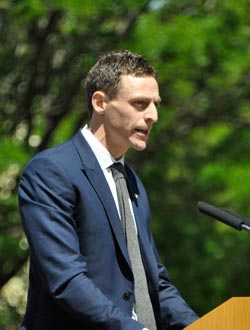
Conor French ’99
Attorney and Social Entrepreneur
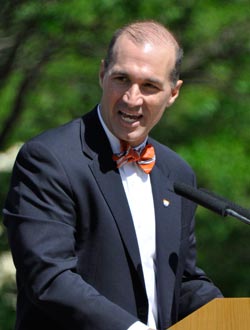
Todd Bland
Head of School
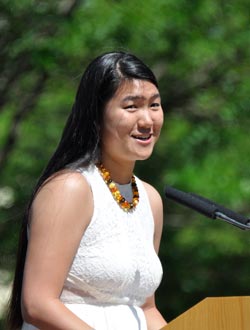
Melody Tan ’16
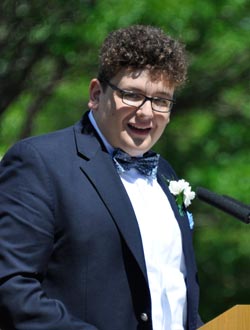
Juan Diego Jaramillo ’16
